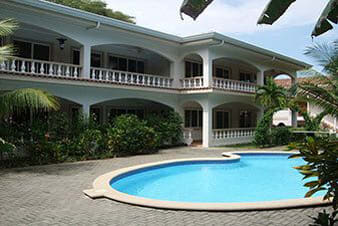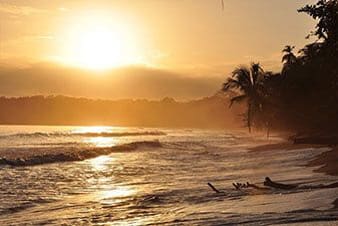BUYING OR INVESTING IN REAL ESTATE
It is Easy To Buy a Home or Vacation Property
The Costa Rican real estate market is very favorable for buyers right now, with some amazing values in virtually all areas of the country. This opportunity to secure beautiful, tropical property at a great price, combined with a country whose people are consistently ranked as the happiest on the planet is making Costa Rica a great location for all types of purchasers. With a stable democracy, a peace loving populace, affordable cost of living, tropical climate and easy direct flights from a host of US, Canadian and European cities, Costa Rica is full of opportunities for all walks of life. Affordably homes are available in many different locations and also many investors are attracted to the real estate market. It is a beautiful country with plenty of natural resources and undeniable temptations, It attracts thousands of tourists every year and retirees. Also, it has started to attract real estate investors from the United States of America, Canada, and Europe due to the great values. You can choose from different types of homes in different climatic zones and environment.
Costa Rica has a cost of living that is much lower than the United States of America, Canada, and Europe. Property taxes and property maintenance is low and makes home ownership attractive. Because of the good infrastructures and the stable economy Costa Rican cities have transformed into cosmopolitan areas with entertainment, restaurants, high speed internet, and many cultural activities. There are more than nineteen thousand seven hundred square miles (fifty-one thousand one hundred square kilometers) of beautiful landscape, with lush green surroundings, that makes it the ideal location for a second home or a retirement home There are one hundred thirty-two miles (two hundred twelve kilometers) of Atlantic coastline and six hundred thirty-one miles (one thousand sixteen kilometers) of Pacific coastline with tropical, sunny, sandy beaches. There are also seven different micro climates from tropical forests, mountains and volcanoes, to sun soaked beaches
A real estate property sale can be easily done in Costa Rica by the buyer and the seller selecting an attorney to draft their buy / sell transfer deed. The title transfer is completed by registering the sale in the legal property registration office, called the Registro National, the Nacional Registry. All property deeds anywhere in the country are filed in the office of the Public Registry in San José.
Renting a Second Home or a Retirement Home
Costa Rica is a great place to call home and affords residents a comfortable and relaxing lifestyle. The inventory of long term rentals in Costa Rica includes luxury homes, condos, villas, rural farm houses, rustic cabins, and beachfront properties. Selling your home and moving into a rental has its good points. Renting may make sense if the children have left home, living alone, ready to downsize, or unsure of where you'll spend your retirement years.
You may want to move here for better weather or a lower cost of living, but also be able to easily move to another area or closer to your family later on. It's important to compare the cost of renting versus owning in the place where you plan to live. When you rent, you will likely not have to pay for major maintenance or taxes. Also, renting may free up money that you can invest. That keeps you liquid and can increase your overall income during your retirement years.
Buying Real Estate as a Foreigner
Any foreigner, whether they are a legal resident or a non-resident has the same rights as a Costa Rican citizen, except for voting, and thus can purchase and own Costa Rica real estate legally, the same as a citizen. There are three exceptions which are that a foreigner cannot own 100% of a property in a Maritime Zone, that a foreigner cannot own an INDER property, which is land is donated to poor farmers by the government, and that a foreigner cannot own land within two kilometers of the national frontiers.
Unlike some of the other countries, foreigners have the same rights when purchasing land in Costa Rica as locals do. You can own property outright in your own name or in the name of your corporation. You do not need a local partner, except in cases of beachfront concession property, where special rules apply. There is absolutely nothing to prevent you from purchasing Costa Rica property in your own name, but the majority of buyers form a corporation with the help of a reputable lawyer and then purchase property through that corporation. The reasons for this are it may be more beneficial to have your income from rentals or capital gain taxed within a Costa Rican company instead of having it taxed as personal income, it allows for simple estate planning since you can give or will the shares of the corporation to members of your family or others, and protect the owners from personal liability for accidents, bodily injury, or government liabilities on the property.
Foreigner Friendly Property Laws
Buying Property in Costa Rica is unlike some of the other countries since foreigners have the same rights when purchasing land in Costa Rica as citizens have. You can own property outright in your own name or in the name of your corporation. You do not need a local partner except in the special case of beachfront concession property. You can purchase Costa Rica property in your own name but the majority of buyers form a corporation with the help of a lawyer and then purchase the property in the name of that corporation. This may be beneficial for taxes, it allows for simple estate planning, and it limits liability. When you sell the property you only need to transfer that shares to the new owner.
Costa Rica is the most attractive Latin American countries for security and quality of life. Because of the luxury real estate market it is an ideal place to invest. It offers a wide range of services and attractions including cultural, commercial and educational centers, recreation, restaurants, clinics, and public areas with high security systems and good transportation. You can also invest in agricultural land or purchase a luxury villa with spectacular mountain views.
Restrictions and zoning
Since Costa Rica has protected areas for green space, parks, water protection, nature conservation, and zoning, you will find setbacks for rivers, forests, and beaches, which are always noted in the National Registry. Many cities also have a zoning plan which controls the land use for residential, business, industrial, agricultural, or protected. The cadaster plan, the survey or plot map, will always show where there are any restrictions. Setbacks from rivers are controlled by INVU.
Almost all property in Costa Rica is titled, more than ninety percent. Any property that is located within fifty meters of the high tide line is public and protected. The next one hundred and fifty meters is the Maritime Zone. This land is used only by a concession from the municipality and a foreigner can own only up to forty-nine percent of the concession. Agricultural property that was donated to farmers by INDER cannot be sold until after the farmer has owned the property for a minimum of 15 years.
Title insurance
Title insurance is available in Costa Rica but is almost never used in real estate purchases. However, If you are interested in getting title insurance for your property purchase you can check with the title insurance companies in Costa Rica.
National Register
All titled property, INDER property, INVU property, and concessions in the Maritime Zone are registered in the National Registry. All registered surveys are found in the National Cadaster which is part of the National Registry.
The National Registry is almost completely digital and certifications of a property, the owners of the property, the zoning, restrictions, and a copy of the survey plot can be found online.
Always Hire a Real Estate Attorney
Citizens, residents and foreigners should all hire an attorney for their real estate purchases. Don’t just hire any attorney for your Costa Rica real estate purchases, I recommend you hire your own bilingual real estate attorney / notary public and not use the attorney of the seller, so that you are well represented. The attorney should explain the buy / sell contract to you and explain the conditions of the sale. Only a notary public can record a purchase in the National Registry through a protocolized deed that is then registered in the National Registry to record the title change. It is normal for the buyer and the seller to pay their own attorneys.
Commissions
It is typical for the seller to pay the real estate commission, which is usually about five percent in the Central Valley and seven percent outside of the Central Valley, like at the beach. Exclusive listing agreements may have a higher commission depending on what advertising materials are agreed to and whatever else the agency will provide.
Closing Costs
You can purchase a property in your own name, in a company to hold the title, or transfer the shares in the current holding company to you. The closing costs of the sale are about four to five percent of the sales price, which is usually shared between the buyer and the seller unless negotiated differently in the sale's contract. The notary public that drafted the sale contract, carries out the real estate closing, and records the property title transfer is required by law to charge a fee that is based on a percentage of the value of the contract. It is about one and one-quarter percent of the sale price.
Required legal stamps are approximately one-third of one percent, registration fees are one-half of one percent, and title transfer taxes are one and one-half percent. All of the costs must be paid before the title change can be registered. Also, all taxes must be paid before the title change registration., If you are wiring funds from a foreign bank the Costa Rican bank may ask for the source of the funds. If the purchase is being financed then the bank charges must be paid at closing along with the mortgage registration fees.
Registering the Title
When you purchase Costa Rica real estate, you can register the purchase in your name or in a corporation. If it is titled in your name and you want to share the ownership of the property with your spouse, another family member, friends, or business partners, then you can have them added to the title. Most people use a Sociedad de Responsabilidad Limitada, an S.R.L., which is similar to an LLC to own property. It that case you can have them own shares in the holding corporation for their part of the ownership. Another way to purchase your property is in the name of your retirement fund or the corporation that represents it, such as an IRA or 401(k). Once the title is registered you can check the ownership in the National Registry using the registration number that is known as the Folio Real of finca number.
Annual Property Taxes
All properties must pay a one-quarter of one percent annual property tax to the local municipality based on the registered value in that municipality. All property owners are obliged by law to re-assess their property every five years. If you do not do so the municipality will do it for you. At closing the seller should bring a certification from the municipality that all of the property taxes are paid up to date. Luxury homes also pay an annual Solidarity Tax, impuesto solidario, or luxury home tax, on a percentage scale that changes every year.
Corporation Tax and Forms
All corporations, subsidiaries, and limited liability companies that are currently registered in the National Registry must pay an annual tax, called the Tax on Legal Entities. If the tax is not paid the National Registry will not issue, certify, or register any documents for the corporation.
The payment can be done every year in the month of January. The amount each corporation pays depends on if it is classified as active or inactive in the National Registry. The amount is based on a percentage of the base salary of a government employee, with an inactive corporation paying fifteen percent of the base salary and active companies paying between twenty-five and fifty percentage of the base salary.
All new inactive corporations must file a form D-140 registration of corporations. The D-140 is the form for reporting the personal contact information for the corporation. The information is to identify the corporation representatives and their location so you report the legal domicile of the corporation and an e-mail address for the corporation. This form is only filed once for each inactive corporation.
All corporations must file form D-135, called Assets Declaration for Inactive Legal Corporations, Declaración Patrimonial para Personas Jurídicas Inactivas, every year in September. The corporations must declare their assets, liabilities and share capital. These assets may be a property, car, boat, airplane, or bank account. In case of a change of corporate shares equals or exceeds fifteen percent of the total share capital the company must file an extraordinary declaration to update the corporation information. The form must be submitted by the legal representative of the corporation using a digital signature. It can also be filed by a Costa Rican attorney using a special power of attorney that is limited to the one purpose of completing the shareholder's registry for one time only. Once the form is completed the power of attorney loses all effects and a new one must be issued for the next filing.
Condominium Fees
If your home is in a condominium, in a gated community, or in some subdivisions, the seller should bring a letter from the condominium administration that all of the HOA fees, homeowners association fees, are paid and up to date. Also, the seller should provide the homeowner with a copy of the homeowners association contract.
Utilities
After the title is registered in the National Registry your attorney can supply a certification of the property ownership, Certificación Literal de Inmuebles, proving that you own the property. You can then take the certification to the power company, the water company, the cable company, and the phone company to change all of the services to your name or your corporation name.



